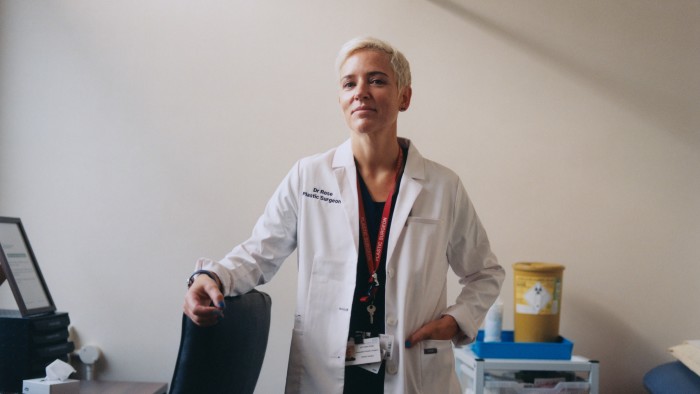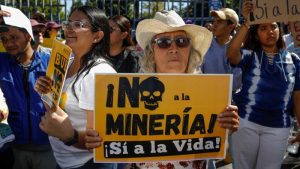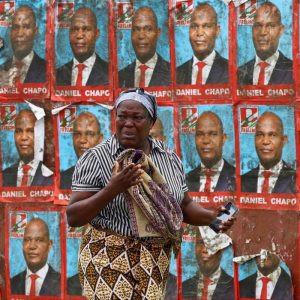‘I’m trying to save lives in a war zone’

In early August, a humanitarian aid bus crossed into Gaza from Kerem Shalom, Israel. Among the passengers were electricians, bomb disposal experts and a British plastic surgeon, Victoria Rose. No one on her bus was of Palestinian heritage: anyone who is has been denied entry since June. Nor did they have any tools. Items that might have been confiscated included toothpaste, sleeping bags and chocolate. When Rose reached one of the few semi-functioning hospitals, she performed major operations with coconut soap and equipment that was around three decades old.
In her day job across two London hospitals, Rose specialises in complex breast reconstruction for women with mastectomies. A serious but sympathetic 52-year-old in red HOKA trainers, with a bleach-blonde pixie crop and blue painted nails, she first visited Gaza in 2019 as part of Ideals, a charity that sends surgical teams and supplies into the tiny Palestinian territory. She jokes that she was “shamed” into going after meeting two fellow surgeons, Graeme Groom and Sarah Phillips, who had been volunteering for a decade. A year later she met Ahmed Mokhallalati, a Palestinian doctor with dreams of offering plastic and reconstructive surgery to the people of Gaza, who undertook a fellowship with Rose in London in 2021. When Mokhallalati returned to Gaza’s (now destroyed) Al-Shifa Hospital and war broke out, against all advice Rose followed him.
The decision was not one she took lightly. The “fight” to return to Gaza was “very hard” for her family: “at the time I felt like I was being a bit of a hard-nosed bitch,” she says. “But it was because I’d met [Ahmed]. I knew him. This was one of my trainees – and he was on his own.”


In 14 months of war between Israel and Hamas, which has controlled the strip since 2007, Rose has been back to Gaza on two occasions: for two weeks in March and for a month in August. In March, she went to the Gaza European Hospital in Khan Younis, a city in the south. Her skills as a plastic surgeon are among the most valuable in warfare: trauma surgery requires an orthopaedic surgeon to fix the bone, and a plastic surgeon to take care of the skin and damaged tissue. “The bulk of it was injuries that people sustained running away from danger,” she says of the workload. “We had a few kids hit by cars while trying to escape a bomb blast; a few had fallen into a vat of boiling water or oil,” she says, adding: “When a bomb goes off, whatever’s around gets weaponised and hits the civilian at high force.” One day she might see a “five-year-old in an explosion who had ruptured her bowel”; on another, a “seven-year-old with most of his nose blown off”. Other victims have been shot by quadcopters, drones with “firepower capability”. And, although Israel has rejected accusations of deliberately shooting civilians, she says she has seen “a lot of sniper injuries”.
In her early visits, she repaired bullet wounds and taught local staff to do the same. For her recent trips she has operated “non-stop – from the moment we got there to the moment we left”. The team is scant – medical staff have always been in short supply due to the difficulty of accessing training – but some of those who assisted Rose in August were, she says, “better than some of the staff I have in the UK”.

When the Gaza European Hospital was evacuated after orders from Israel, she spent August in nearby Nasser. “The OCHA [United Nations Office for the Coordination of Humanitarian Affairs] data has always said there were 36 hospitals in Gaza,” says Rose. “But actually there were only ever four that could manage mass casualties or even major trauma – and one has been completely destroyed.”
In her two trips since the war began, Rose describes Gaza as having become a “moonscape” – an eerie wasteland of rubble and flattened earth, punctuated by a lone apartment block or a single tree. “It’s almost like, ‘Oh my God, how’s that still there?’” she says. She describes how, closer to Khan Younis, she has seen the emergence of a vast temporary encampment – tents “as far as the eye can see”. According to the UN, 1.9 million of Gaza’s 2.2 million population have been displaced since October 2023. They now live in makeshift shelters and await the onset of winter. Even before Hamas’s 7 October attack that killed 1,200 people, and Israel’s retaliatory offensive in Gaza that has killed close to 50,000, Palestinians couldn’t construct water facilities without permission from the Israeli army: around 95 per cent of the water supply was unfit for consumption. Still, it was a functioning territory – a place with infrastructure, dinner parties and hotels. “They weren’t luxurious,” caveats Rose, who stays in a guest house in what Israel has designated as Gaza’s humanitarian zone. “But people were living lives.”

Rose believes all of her patients have been civilians, around 80 per cent of whom have been aged between five and 14. (Oxfam analysis has revealed more children have been killed in Gaza by the Israeli military this year than in the equivalent period in any other conflict of the past 18 years.) Aid workers’ journeys into Gaza are supposed to be “de-conflicted” with Israel Defence Forces; “they know where we are at all times,” says Rose. And yet the International Rescue Committee estimates that more than 300 aid workers have been killed, the highest number in any single crisis in world history. “You go knowing the risks and you take all the precautions that you can,” says Rose. “I think we all accept that you can’t be protected while you’re there.”
How to give it
British Red Cross donate.redcross.org.uk
Doctors Without Borders msf.org.uk
Ideals ideals.org.uk
Medical Aid for Palestinians map.org.uk
UK-Med uk-med.org
Before Israel seized the Rafah Border Crossing – Gaza’s only entry and exit point that does not border Israel – Rose, Groom and Phillips were able to bring in 25 suitcases of medical supplies. In August, entering through Israel, she was limited to one bag containing food for a month and only “personal items – no equipment was to go in”. Rose managed to sneak in a “small set of instruments that are crucial for plastic surgery”; what would she have done without it? “God knows.” Israel claims the confiscated items could be repurposed for military objectives; Ideals is waiting to be able to send in vast quantities of medical aid, including orthopaedic and plastic surgery equipment.

For medics, Israel’s blockade and restrictions mean reusing disposable scalpels or operating with equipment first supplied in the 1990s. It means using coconut soap instead of surgical scrub and waiting days to change wound dressings. Towards the end of Rose’s visit in August, the hospital had nearly run out of the antiseptic solution used for operations. “They were watering it down as I left,” she says.
“Every level of hospital need is missing,” says Nahreen Ahmed, a medical coordinator working in Gaza as part of humanitarian NGO UK-Med. “I’ve been to Yemen, Sudan, Ukraine, Syria. This is probably the harshest environment I have worked in.” Along with supplies being limited, COGAT – the Israeli military body responsible for affairs in Gaza and the West Bank – have increased deployment times to a minimum of a month. Ideals’ available volunteers went from 40 to two.


In late October, the Knesset passed a bill to ban UN Palestinian relief agency UNRWA, which it has facilitated since 1967 as part of an agreement following the capture of the West Bank and Gaza, from operating in Israel. This decision, says Rose, is “a devastating blow to the whole region”. Speaking at a panel for the International Centre of Justice for Palestinians, she said: “I was continually asked by my Palestinian colleagues how the world can stand and watch us treat all these infants that have been bombed and burnt. It was difficult for me because everybody that I know and I speak to thinks that what’s going on is absolutely outrageous and that it needs to stop immediately. […] I’m sick of hearing about Hamas terrorists and Israel’s right to defend itself. The bottom line is, this is a human-rights issue and children are being murdered. It’s got to stop.”
Rose hopes to go out to Gaza again in February – even with dwindling supplies. But with increasing deployment times, it’s harder to take leave, even unpaid. She’s also aware of the toll her visits have on her family, most of all her partner, and that speaking out about the crisis might “jeopardise [her] chances of getting back in”. For now she’s focusing on raising awareness of the crisis with the hope of a ceasefire. “It’s important to keep the politics out and stick to the human-rights issue,” concludes Rose. “That’s easy to do as a doctor. A ceasefire does not mean that we support Hamas. A ceasefire means that we stop killing people.”
#save #lives #war #zone







